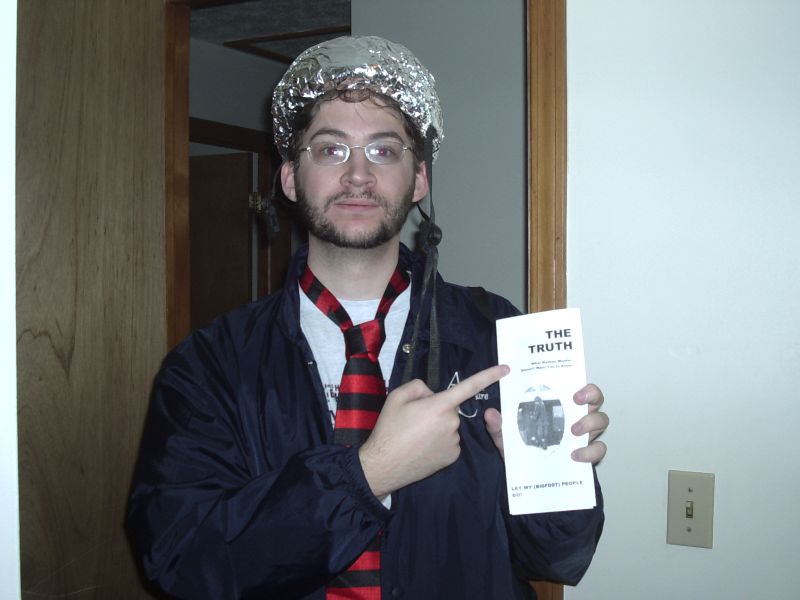What “They” Don’t Want You to Know About Conspiracy Theories

A young man holding a pamphlet labeled “The Truth”, donning a red, striped tie and tin-foil hat. “Conspiracy Nut” by Will is licensed under CC BY 2.0 on Flickr.
Is there “a single group of people who secretly control events and rule the world together”? According to a December 2023 poll by YouGov, 41% of Americans think so. Even more – 54% – said Lee Harvey Oswald wasn’t acting alone when he shot President John F. Kennedy. No matter how you slice it, belief in conspiracy theories is widespread. But what actually is a conspiracy theory? And why do so many people believe in them, while others don’t? There’s a wide array of social science research that has tried to answer these and other questions related to these controversial ideas.
What is a Conspiracy Theory, Anyway?
Scholars have offered multiple definitions of a conspiracy theory. According to one definition, a conspiracy theory alleges that “powerful and secretive groups” of people are engaged in some kind of evil and secret activity. In another definition, the conspiratorial worldview has three main components. 1) “nothing happens by accident”: world events almost always happen because someone intended for them to happen. 2) “nothing is as it seems”: agents of the conspiracy are lying to you. 3) “everything is connected”: secret patterns are everywhere.
Why Do People Believe?
Many different people believe in many different conspiracy theories for many different reasons. Nonetheless, people are more likely to believe in some circumstances more than others. In general, people are more likely to believe conspiracy theories that portray their political opponents negatively. Also, people who know a lot about politics but don’t trust either powerful institutions or other people very much are especially likely to believe in conspiracy theories.
One recent paper found that conspiracy beliefs are “U-shaped”: those at the top and bottom of the socioeconomic ladder are more likely to believe in them, while people in the middle are less likely to believe. People are also more likely to believe in conspiracy theories during potentially threatening or insecure times in society, such as higher levels of unemployment, as well as political and demographic changes.
Mixing It Up
Scholars have compared conspiracy theories to other types of ideas, including rumors, folk theories, and fake news. Whatever we call them, the things we think we know are always grounded in our communities and social norms. The truth is always contested. The social construction of “knowledge” is especially true for subjects where most non-specialists don’t have a lot of prior experience, such as science or medicine.
Conspiracy theories are an example of “stigmatized knowledge”: ideas that are denied by mainstream institutions like universities, the scientific community, and the government. Some argue that these ideas are becoming more mainstream, in part thanks to the internet and declining trust in authority. Some scholars claim that, while promoters of stigmatized ideas oppose what they view as the mainstream, they are often receptive to each other’s beliefs. For example, one study found that after people started believing in conspiracy theories about the COVID-19 pandemic, they often started to hold more conspiratorial beliefs in general.
- Michael Barkun. 2015. “Conspiracy Theories as Stigmatized Knowledge.” Diogenes 62(3–4):114–20. doi: 10.1177/0392192116669288.
- Colin Campbell. 2002. “The Cult, the Cultic Milieu and Secularization.” in The Cultic Milieu: Oppositional Subcultures in an Age of Globalization, eds. Jeffrey Kaplan and Heléne Lӧӧw. Walnut Creek, CA: AltaMira Press.
- David G. Robertson. 2020. “Cultic Milieu.” in The SAGE Encyclopedia of the Sociology of Religion, edited by A. Possamai and A. J. Blasi. 2455 Teller Road, Thousand Oaks, California 91320: SAGE Publications, Inc.
- Gary Alan Fine. 2021. “Viral Buzz: Rumor and Its Disruptions in Pandemic Uncertainty.” Sociologica 43-53 Pages. doi: 10.6092/ISSN.1971-8853/11620.
- Samayoa Granados, Javier A., Courtney A. Moore, Benjamin C. Ruisch, Shelby T. Boggs,Jesse T. Ladanyi, and Russell H. Fazio. 2022. “A Gateway Conspiracy? Belief in COVID-19 Conspiracy Theories Prospectively Predicts Greater Conspiracist Ideation” edited by R. Rowe. PLOS ONE 17(10):e0275502. doi: 10.1371/journal.pone.0275502.


